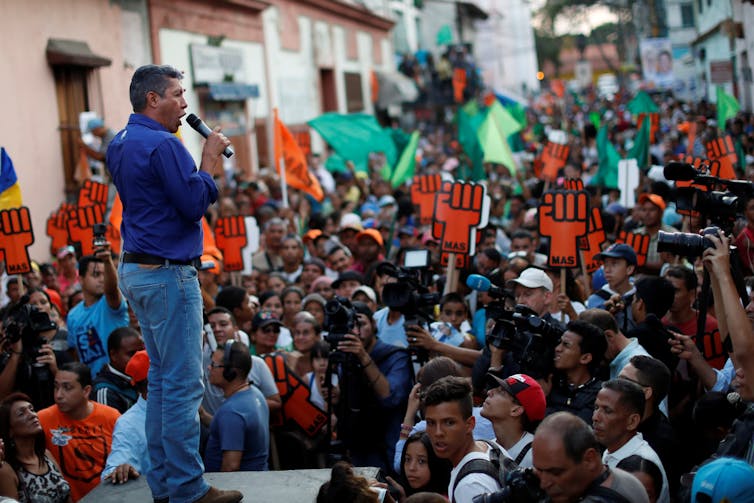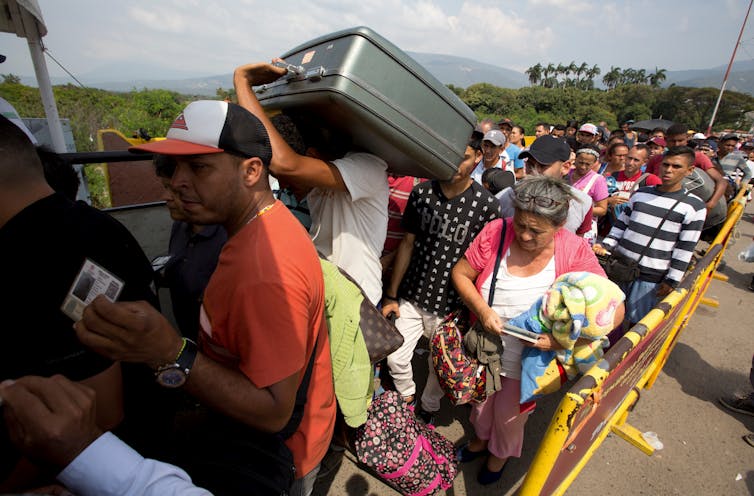Venezuelans are boycotting their presidential election
- Written by Marco Aponte-Moreno, Assistant Professor of Global Business, St Mary's College of California
Venezuela’s May 20 presidential election may be an election in name only.
Nicolás Maduro is widely expected to be reelected as Venezuela’s president despite his 20 percent approval rating[1] and profound mismanagement of the country’s humanitarian and economic crisis[2].
Maduro’s strongest competitor is Henri Falcón[3], a former state governor once associated with the Venezuelan opposition. But he broke ranks with opposition parties over their decision in February to boycott[4] a presidential election they consider fraudulent.
The government has grown increasingly authoritarian since Maduro was narrowly elected in 2013 to succeed Hugo Chávez[5], Venezuela’s popular leftist leader and Maduro’s mentor. The Socialist regime is now deploying all its amassed powers to ensure that this disliked president wins reelection.
As a Venezuelan academic[6] who has followed the country’s politics for two decades, I believe that voter participation on Sunday will merely legitimize Maduro’s regime by making it appear democratic.
Reasons not to vote
Mimicking democracy is a classic trick of authoritarian leaders worldwide[7].
Since announcing it would hold a 2018 presidential election[8], Maduro’s government has severely limited who can appear on the ballot. Four of the five most prominent opposition leaders have been either jailed or barred from office[9] – a main reason for the boycott.
And since many Venezuelans view Falcón as a traitor[10] whose bid for the presidency helps Maduro, millions of voters are without a viable candidate.
 Falcón has little chance of uniting opposition voters against Maduro.
Reuters/Carlos Garcia Rawlins
Falcón has little chance of uniting opposition voters against Maduro.
Reuters/Carlos Garcia Rawlins
Legally, the election may be unconstitutional because it was called by the Constituent Assembly. The Socialist Party created and installed this legislative super body in 2017 to undermine the opposition-dominated Venezuelan National Assembly[11].
Many Venezuelans generally distrust[12] their electoral system – for good reason.
Smartmatic, the London-based company that long provided Venezuela’s voting machines, announced that the turnout to vote for Maduro’s Constituent Assembly in 2017 was manipulated[13]. It calculates that at least 1 million phantom voters were added to the final count. Similar problems were documented in Venezuela’s 2017 gubernatorial elections[14].
Smartmatic terminated its Venezuela operations[15] in March.
According to political scientist Javier Corrales, who lead a recent Amherst College study on Venezuela’s electoral system[16], Maduro’s regime has committed “at least 10” of 11 possible pre-election irregularities[17].
These include calling early elections, which favored Maduro’s ruling Socialist Party[18], blacklisting candidates and parties, and failing to update voter registries. Venezuela has rejected calls for international election observers[19].
Hunger as a political tool
Maduro has also manipulated Venezuela’s spiraling humanitarian crisis[20] to his electoral advantage. Since 2015 food, medicine, electricity and even clean water[21] have grown ever scarcer in Venezuela.
Hunger is spreading. According to a February survey[22] by three Venezuelan universities, almost 80 percent of respondents eat less than they used to. Sixty percent go to bed hungry. And nearly two-thirds have lost more than 20 pounds this past year.
In January 2017, Maduro’s regime introduced a national identification document that gives cardholders access to government food aid and other social services. But according to an investigation by El Nacional[23], Venezuela’s nonpartisan leading newspaper, citizens only get those benefits if they agreed to vote for Maduro when they signed up.
The international organization Human Rights Watch confirms this account. Its Americas researcher says citizens are “hostages of hunger,” with Maduro’s regime exchanging food and other services[24] for votes.
Mass exodus
Another key constituency that will be notably absent from Sunday’s election: Venezuelan refugees.
Over 4 million people have left the country in recent years[25], fleeing hunger, corruption and violence. Business professionals began leaving Venezuela after Chávez’s 1998 election[26], but mass migration has spiked since the crisis began in 2015.
U.N. officials say Venezuelan refugees will soon overtake Syrian refugees[27] in number.
 An estimated 4,000 Venezuelans cross the border into neighboring Colombia every day. At least 1.5 million refugees have left Venezuela over the past year.
AP Photo/Fernando Vergara
An estimated 4,000 Venezuelans cross the border into neighboring Colombia every day. At least 1.5 million refugees have left Venezuela over the past year.
AP Photo/Fernando Vergara
To vote in Sunday’s presidential election, Venezuelans living abroad must show legal residence overseas[28]. Since many refugees live undocumented for long periods of time, this requirement – passed in 2009 by Chávez’s Socialist Party – will disenfranchise an estimated 1 million Venezuelans[29].
Global pressure
The United States, Canada and numerous Latin American countries recently signed a joint statement[30] asking Venezuela to cancel the May 20 election. All have threatened to ramp up sanctions if it goes forward, as has the European Union[31].
Maduro insists that the election will be held[32] as planned.
The regime’s real challenge, then, could come after the vote. Increased sanctions could translate into an embargo on Venezuelan oil[33]. International oil sales are by far the government’s main revenue source[34].
That would be devastating for Maduro’s cash-strapped government[35] – not to mention the Venezuelan people.
References
- ^ 20 percent approval rating (www.elnuevoherald.com)
- ^ the country’s humanitarian and economic crisis (theconversation.com)
- ^ Henri Falcón (www.miamiherald.com)
- ^ boycott (www.reuters.com)
- ^ since Maduro was narrowly elected in 2013 to succeed Hugo Chávez (www.theguardian.com)
- ^ a Venezuelan academic (www.stmarys-ca.edu)
- ^ classic trick of authoritarian leaders worldwide (www.tandfonline.com)
- ^ announcing it would hold a 2018 presidential election (www.washingtonpost.com)
- ^ jailed or barred from office (www.infobae.com)
- ^ traitor (www.reuters.com)
- ^ undermine the opposition-dominated Venezuelan National Assembly (www.npr.org)
- ^ distrust (theconversation.com)
- ^ manipulated (www.reuters.com)
- ^ 2017 gubernatorial elections (www.wsj.com)
- ^ terminated its Venezuela operations (www.el-nacional.com)
- ^ Amherst College study on Venezuela’s electoral system (www.amherst.edu)
- ^ 11 possible pre-election irregularities (www.nytimes.com)
- ^ favored Maduro’s ruling Socialist Party (www.nytimes.com)
- ^ international election observers (www.smh.com.au)
- ^ humanitarian crisis (www.hrw.org)
- ^ food, medicine, electricity and even clean water (www.as-coa.org)
- ^ February survey (www.ucab.edu.ve)
- ^ an investigation by El Nacional (www.el-nacional.com)
- ^ exchanging food and other services (www.nytimes.com)
- ^ 4 million people have left the country in recent years (www.washingtonpost.com)
- ^ after Chávez’s 1998 election (theconversation.com)
- ^ will soon overtake Syrian refugees (www.washingtonpost.com)
- ^ show legal residence overseas (www.diariolasamericas.com)
- ^ an estimated 1 million Venezuelans (www.abc.es)
- ^ joint statement (www.reuters.com)
- ^ as has the European Union (www.reuters.com)
- ^ the election will be held (www.lavanguardia.com)
- ^ an embargo on Venezuelan oil (www.cnbc.com)
- ^ by far the government’s main revenue source (www.reuters.com)
- ^ Maduro’s cash-strapped government (money.cnn.com)
Authors: Marco Aponte-Moreno, Assistant Professor of Global Business, St Mary's College of California
Read more http://theconversation.com/venezuelans-are-boycotting-their-presidential-election-96702

